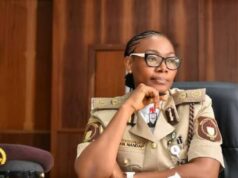FRI 19 NOV, 2021-theGBJournal- A judicial panel has found that army and police officers shot, injured, and killed unarmed protesters at the Lekki Toll Gate in Lagos, Nigeria during nationwide protests against police brutality in 2020, Human Rights Watch said today. This confirms Human Rights Watch findings, which the panel said the authorities tried to cover up.
The panel of inquiry’s 309-page report became widely available online after it was submitted to the Lagos State Governor by members of the judicial panel on November 15, 2021. The report has yet to be officially released to the public but those involved in compiling it, according to media sources, have confirmed that the version in circulation was submitted to the Lagos State government.
“The panel confirmed the crackdown on protesters who were standing up against the ruthlessness of the Nigerian police force,” said Anietie Ewang, Nigeria researcher at Human Rights Watch. “The authorities should stop denying the truth and focus instead on correcting their wrongs by officially releasing the report and acting upon its findings.”
In October 2020, young people across Nigeria took to the streets calling for disbanding the Special Anti-Robbery Squad (SARS), an abusive police unit, and for ending police brutality in a movement tagged #EndSARS.
On October 15, Bababjide Sanwo-Olu, the Lagos state governor set up the Lagos state judicial panel of inquiry alongside other state judicial panels to receive and evaluate public complaints of police abuses, including extrajudicial killings, to identify officers who should be prosecuted and to recommend compensation for victims.
Governor Sanwo-Olu extended the panel’s mandate to include investigations into the incidents that occurred on October 20, when army officers shot at a large group of protesters holding a peaceful sit-in at a toll gate in Lekki, a Lagos suburb. While the authorities responded to protests in other parts of Lagos and across Nigeria – including in Ogun, Oyo, and Abuja – with excessive force, the crackdown at the Lekki Toll Gate was by far the worst, and was streamed live on social media by protesters.
The Nigerian army initially responded to news of the shooting at the Lekki Toll Gate by labeling posts on the incident as fake news on its verified Twitter accounts. However, on October 27, Major Osoba Olaniyi, a spokesperson for the 81st army division, said in a statement that soldiers had been deployed on orders from the Lagos State government to enforce the statewide curfew, but denied that troops shot at protesters.
Human Rights Watch found that the soldiers surrounded protesters at the toll gate and opened fire in the air and at them. Witnesses said that after the soldiers left, police officers arrived and began shooting at protesters who had not managed to flee. Human Rights Watch was not able to ascertain the total number of those killed by the military during this incident, but witnesses said they saw at least 15 lifeless bodies and that military officers took away at least 11 of them. Witnesses also reported that the police shot and killed at least two protesters and took their bodies away.
The panel’s report corroborated the Human Rights Watch accounts of shooting and bodies taken away by security forces. The report was assembled after the panel heard testimony from people including victims and representatives of key agencies involved, including the operators of the Lekki Toll Gate, the army, the police, the Lagos state government, and hospitals that treated the victims.
While the panel indicated that it was not able to ascertain the total number of those killed, it presented a list of 48 casualties, including 11 dead, 4 missing and presumed dead, and 21 wounded by gunshots. The panel found that there were many casualties, but that the army refused to allow ambulances to rescue wounded protesters, contributing to the large number of deaths and other casualties.
The panel also corroborated Human Rights Watch findings that army officers at the scene picked up bullet shells in an effort to cover up their actions. The report provided further details of other efforts to cover up the incident, including a cleanup of bloodstains and other evidence at the scene by the Lagos State Waste Management Authority the next morning.
The panel refuted the testimony of a senior police official implicated in the shooting, who claimed that officers from his station were on lockdown around the time of the shooting and not at the scene. But the panel reviewed the police station’s weapons registers, which indicated that a huge supply of ammunition was signed out that day for patrols in places including Lekki and that it was not returned.
Based on its findings, the panel recommended, among other actions, appropriate disciplinary measures and dismissals of army officers implicated in the abuses. The panel also recommended prosecuting police officers implicated in indiscriminate shooting and killing of protesters as well as compensation for victims to be paid out promptly.
Governor Sanwo-Olu, after receiving the report of the panel on November 16, stated that a committee led by the state attorney general would be established to develop a white paper within two weeks, following which the Lagos State Executive Council will take possible action. He also pledged that the reports and recommendations will be made public and submitted at the national level for discussion.
“While the findings and recommendations of the panel are a positive step toward justice, they will be ineffective without immediate action from relevant authorities,” Ewang said. “The security forces with the support of the Federal and Lagos State authorities should immediately begin internal disciplinary measures to prosecute and hold abusers to account.”
Twitter-@theGBJournal|Facebook-The Government and Business Journal|email: govandbusinessj@gmail.com









